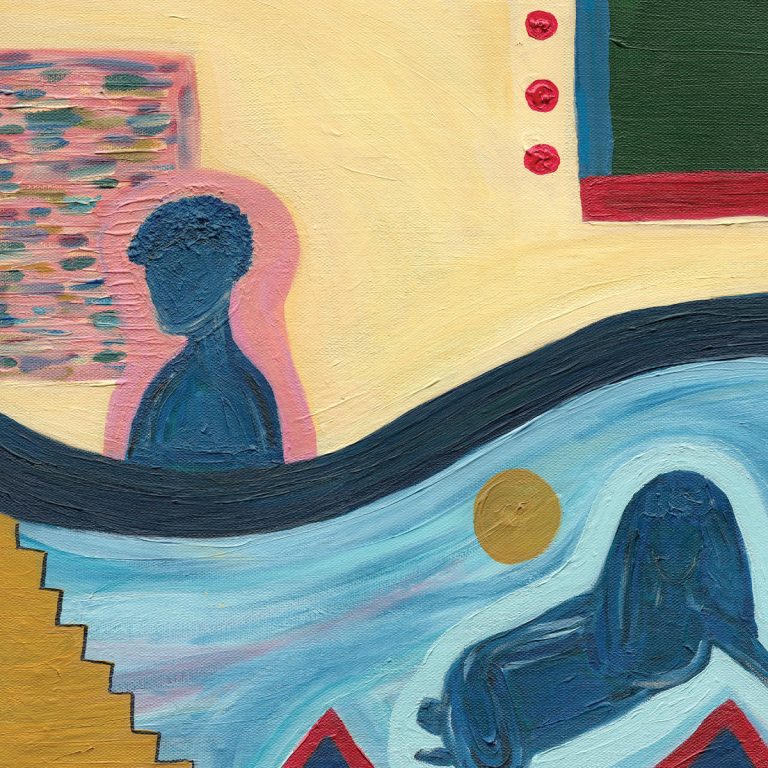Courtney Marie Andrews’ discography brims with sketches of doomed relationships and precarious psychological states. Her new album, Loose Future, however, shows her pivoting into a comparatively equanimous perspective. Produced by Sam Evian, Loose Future is brighter and more buoyant than Andrews’ prior output, the Arizona-born artist displaying her well-honed songwriting and impressive vocal skills while adopting a pop-adherent sound.
The opening title track features a bouncy acoustic guitar and perky drum part courtesy of Grizzly Bear’s Christopher Bear. Andrews seems unprecedentedly self-accepting. “I just want to take it slow / don’t want to give a yes or no,” she sings, informing her potential partner that she is indeed interested, though she’s wary of making a premature commitment. Her melody is engaging, summery, a hooky blend of country, folk, and pop elements that brings to mind Taylor Swift’s Covid-era releases.
With “Older Now”, Andrews navigates a similarly ebullient mix. “Life is better without plans,” she offers, romantically enthused yet still grounded in reality, prepared to engage yet free of naïve notions and dysfunctional expectations. Andrews’ lilting melody and slightly throaty vocal, complemented by phase-shifted guitar accents from Bonnie Light Horseman’s Josh Kaufman hint at Neil Young’s influence, notably 1992’s Harvest Moon.
With “Satellite”, Andrews offers hard-won yet humble wisdom, reveling in a meditative awareness that recalls Cassandra Jenkins’ An Overview on Phenomenal Nature and Karima Walker’s Waking the Dreaming Body, two of 2021’s standout albums. “Good Old Days”, meanwhile, is a reminder that Ram Dass was right: be here now. “These are the good old days,” Andrews proclaims, warning us (and herself) not to “let time slip away.”
“You Do What You Want” is a portrait of that person – we’ve all known them or at times even been them – who inexplicably gets second, third, and fourth chances, “the kind of person that everyone forgives.” The piece displays Andrews’ ability to filter a universal experience (driving around “high off our asses”) through a current and presumably wiser perspective, shedding light on simple truths: some people have an innate charm; they’re thrilling to be around… and potentially dangerous.
“Let Her Go” is the album’s most starkly mixed and direly performed track, Andrews drawing from melancholic templates used to good effect on 2016’s Honest Life and her previous LP, 2020’s Old Flowers. The song possibly reveals Andrews reflecting on an old version of herself, how she could be difficult and even toxically inclined, though she was also energetic, fun, and charismatic (perhaps she was one of those people referenced in “You Do What You Want”).
Closer “Me and Jerry” is a story of “two vagabonds with a history.” Andrews’ fluid melody, dynamic vocals, and declarative lyrics (“I’ve lost track of all the people at my door”; “Jerry loves more than my body”) are reminiscent of 70s-era Joni Mitchell, specifically Blue’s final number, “The Last Time I Saw Richard”. “Me and Jerry” is also Loose Future’s sonic tour de force, employing lush synths and a Broadway-ready chorus of back-up vocals.
With Loose Future, Andrews transforms herself from a folk-leaning solo act to a collaboratively minded popsmith. In terms of perspective, she sheds any semblance of victimhood, accepting that, as the existentialists would say, we weave meaning from meaninglessness, constructing our lives moment to moment. With Loose Future, Andrews reinvents herself, staying open to experiential and aesthetic possibilities.

